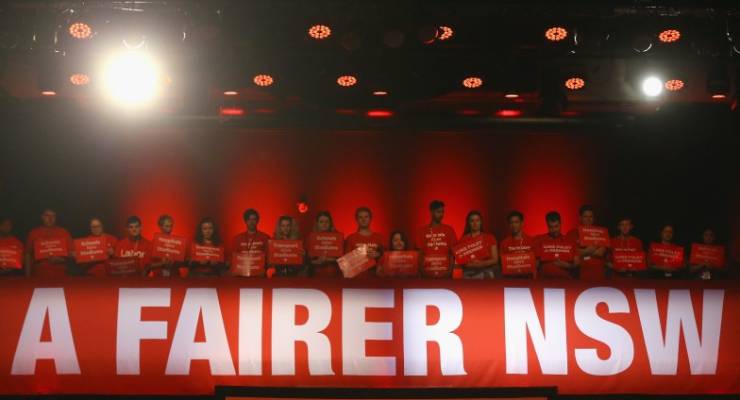
Short of towing the NSW Labor Party out to sea and sinking it, is there anything that can be done about persistent corruption in NSW?
It’s clear from evidence emerging at the NSW Independent Commission Against Corruption inquiring into political donations that the party that gave us a series of corrupt ministers persists in simply refusing to abide by the most basic rules of ethics and probity.
But while the media focus is on individual donors and party officials like NSW Labor secretary Kaila Murnain, let’s not forget the structural reason why corruption keeps happening in NSW — and most likely would be revealed at the federal level if the Coalition ever permitted a fair dinkum ICAC to be established in Canberra.
Political donations are at the centre of the worst scandals in Australian public life in recent years. It was donations that killed the careers of multiple Liberal politicians in NSW, ended the premiership of Barry O’Farrell — NSW’s and Australia’s best premier since Nick Greiner — and wrecked the prospects of Arthur Sinodinos. In 2016, the NSW Electoral Commission found that the NSW Liberals had “channelled and disguised” donations from prohibited donors, and withheld public funding from the party.
Donations are why the federal Liberal Party ran a protection racket for the big banks for years before the abuses of the latter became too big to hide. Donations are how the gambling and hospitality industries keep gambling regulation at bay across Australia. Donations were what One Nation apparatchiks were after when they went to America hoping to subvert Australia’s gun laws. And foreign donations, until finally outlawed by the Coalition (which voted to keep foreign donations in 2009) were a key vehicle for Chinese government influence in both sides of politics.
Both NSW and Queensland have tightened up laws around domestic donations over the last decade, particularly around donations from property developers, who routinely used donations to undermine planning regulation at the local and state level. And both have reporting regimes for political donations that are superior in every way to Commonwealth laws. But both sides have been caught out trying to evade those restrictions, with no real long-term consequences either for the parties or individuals concerned.
This is of a piece with the broader nature of donations regulation in Australia: embarrassment is the primary punishment if you breach the rules around donations, and even then, your political opponents won’t exploit it because they know it could just as likely be them in the headlines.
The challenge of regulating donations effectively is that both donors and the parties have such strong incentives to game, circumvent or simply break laws restricting them. Donations are crucial to campaign advertising and voter research and marketing. They are a key tool by which interests both legitimate and illegitimate try to influence politicians. They are a means of buying access to key decision-makers. Yet, especially at the Commonwealth level, they remain relatively poorly regulated despite the best efforts of electoral authorities and anti-corruption bodies.
You could remove Kaila Murnain, and the NSW Labor Party, but poorly-regulated donations mean they’d be replaced by someone else, and by another party. The only structural solution is to remove donations altogether, or limit them to a small amount that would reward grass-roots organisation and campaigning, and apply the same rules to third-party groups like GetUp and trade unions. The only victims would be media companies that would be deprived of a regular injection of several million dollars from taxpayers for political advertisements that voters hate anyway, robopoll companies and printers of junk mail that goes straight to recycling.
And without a federal ICAC, under lax Commonwealth donation laws, who knows what payments are being made to Labor and Liberal party officials around the country, in pursuit of what objectives?
Bernard Keane will be taking a well earned break starting today. He will return to regular programming in early October.








Spot on, Bernard. Love to know how we could get a Federal ICAC going when our biggest businesses, media organisations and politicians are engaged in financial circle jerks. Enjoy your break.
How quickLY we forget, it only seems like yesterday that arthur seenodonors had a bad memory failure when questioned about developer donations to the liberal party and liberal member for paterson Bob Balwdwin and the state liberal member for port stephen resigned (along with several other prominent liberal members), its time for a major cleanout and a federal ICAC is a must at the national level and one as well as every state and territory level, the way the coalition desperately stops any attempt to introduce it makes you wonder just what they have to hide.
I think Bernard makes a very good point that the LNP at any level will not make much noise about Labor’s current embarrassment, because they have a huge amount to hide themselves and will be hoping the attention disappears quickly and the stupid voters promptly forget the awful stink.
The last government which made a serious effort to combat the corruption inherent in the NSW establishment was that of William Bligh.
I’d love to see a grassroots model where funding is in some way tethered to membership instead of institutionalised status quo biases (e.g. to maintain the two-party system) and how well prospective MPs and their secretariats can network with the wealthy and powerful. It’d also help to have proportional representation in all houses and elect multiple MPs for each electorate, but that’s a slightly different issue.
It’s a shame, then, that radical donations reform would probably be stumped by the constitutionally implied freedom of political communication.
Another great piece from Bernard. In a proper democracy we’d all get a say on whether he’s allowed a break (I say No).